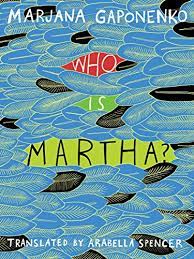by Nicole Yurcaba

Marjana Gaponenko, originally born in Odesa, Ukraine, is a German writer whose novel Who is Martha? was described by Der Spiegel’s Volker Hage as “As amazing as the young author.” And, quite honestly, as a fan of New Vessel Press’s translations and publications, I have to second Hage’s opinion. Translated by Arabella Spencer and published in 2014, Gaponenko’s stellar novel Who is Martha? is just as socially and ideologically relevant as it was upon first publication nine years ago. The novel follows Luka Levadski, a 96-year old ornithologist who receives a lung cancer diagnosis and forgoes treatment. Rather than subject himself to excruciating, and rather pointless, chemotherapy, Levadski decides to lock up his apartment in Ukraine and head to Vienna, where he will spend his remaining days living a luxurious life in the Hotel Imperial. Levadski indulges himself with expensive dinners, Viennese cakes, and music in a gilded concert hall where he spent many formative, childhood evenings. He contemplates his past, and like Martha — the last passenger pigeon that died in 1914, the same year as Levadski’s birth — Levadski’s awareness about what it means to be the last of a species grows daily.
One layer of the charm of Who is Martha? can be directly attributed to Levadski himself. Levadski is quirky in the personal and academic sense. He’s a confirmed bachelor who lives in a small, book-laden apartment. Despite his retirement, his ornithological studies and past accomplishments are still important to him. His affection for Vienna, as readers discover, is not superficial admiration or a one-time tourist’s glossy romanticism. Levadski spent time in Vienna as a child with his two great-aunts, who took him with them to concerts and shaped his initial impression of the arts. As an elderly, dying man, Levadski returns to the same music hall to relive his youthful, musical moments. This return to a significant place at a different stage of life bring’s one of Levadski’s many, complex circles to a close as he faces his death. Also, it affirms for readers his personal complicatedness as a scientific man whose life and interests transcend typical boundaries. In this, Levadski becomes the aged poster-boy for a well-lived and well-rounded life — and death.
Another layer of the novel’s charm is its commentary about national and ethnic identity. Levadski hails from Galicia, a historical region which spanned what is now southeastern Poland and much of western Ukraine. The area was, for a long time, part of the Polish-Lithuanian Commonwealth. For modern readers, and especially those unfamiliar with Eastern European history and geography, the reference might be a bit confusing. Thus, it is important to understand that the region to which Levadski refers consists of the areas spanning present-day Lviv, Ternopil, and Ivano-Frankivsk. The area also consisted of another important area, known as Red Ruthenia. This is significant to Gaponenko’s novel because, at one point, Levadski refers to himself as “an old Ruthenian.” The term “Ruthenian” refers to an East Slavic population and was used primarily during late medieval and early modern periods. However, the term still holds significance today, especially as Carpatho-Rusyn populations throughout Eastern Europe move to re-establish an independent identity separate from their nationality. The complex history of this area and its people does not receive an in-depth focus. However, it is significant enough to Levadski that he reflects that in “the politica sense” he “really was from Ukraine,” but from “a historical perspective” he was from “two utopias: Austro-Hungary and the Soviet Union.” What bears even more importance and relevance to Levadski is that he “had survived two systems of government.” Levadski’s matters of identification bear even more contemporary significance, especially in the context of books like Olesya Khromeychuk’s A Loss, which presents the case that for Ukrainians, what passport one holds becomes synonymous with one’s personal and national identity and serves as a constant reminder of one’s homeland. Thus, while Who is Martha? is not an inherently or overtly political novel, it is at points like this that it quietly transforms into one.
Perhaps one of the most important lessons readers can take from Who is Martha? is the importance of dying on one’s own terms. Upon receiving his diagnosis, Levadski faces a difficult choice: subject himself to painful, toxic chemotherapy which will only prolong his life by a few months or live life on his own terms for the few short weeks or months he has remaining. Levadski chooses the latter, and, given the novel’s time setting, his is a rather progressive decision. Also, his attitude regarding dying is rather progressive and aligns with more recent movements like Caitlin Doughty’s radical, funeral industry-transforming The Order of Good Death. Therefore, Levadski becomes a figurehead of sorts for individualizing the death experience. He reminds readers that death is a necessary part of the biological cycle and, perhaps, one should die as they lived.
Who is Martha? is a swift read, and its pacing mimics Levadski’s physical decline. By the book’s conclusion, readers have ventured with Levadski through his clear, keen remembrances of a past which has transformed him into the witty, likable dying man readers meet. Most of all, what they take with them long after they exit Martha’s pages is an inspiration to go forth, do better, and to live.
Nicole Yurcaba (Ukrainian: Нікола Юрцаба–Nikola Yurtsaba) is a Ukrainian (Hutsul/Lemko) American poet and essayist. Her poems and essays have appeared in The Atlanta Review, The Lindenwood Review, Whiskey Island, Raven Chronicles, West Trade Review, Appalachian Heritage, North of Oxford, and many other online and print journals. Nicole teaches poetry workshops for Southern New Hampshire University and is a guest book reviewer for Sage Cigarettes, Tupelo Quarterly, Colorado Review, and The Southern Review of Books.



Add your first comment to this post